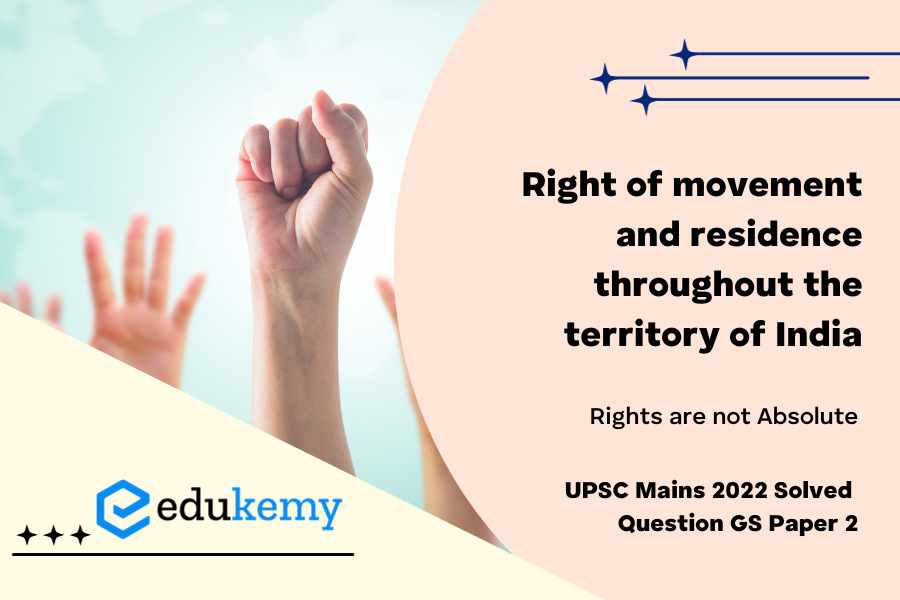Indian citizens possess the right to move and reside anywhere within the nation, yet these liberties are not without limitations. Certain restrictions, including those related to security, public order, and the rights of others, can curtail this freedom. Legal provisions ensure a balance between individual rights and societal interests within India.
UPSC Mains General Studies Paper – 2 Mains 2022
UPSC Mains Civil Services IAS Exam Question Paper – 2022
Theme: Fundamental Rights
Contents
Approach
Introduction: Write down the constitutional provisions that guarantee. Right of movement and residence and Constitutional restrictions under Art 19 (5) which make it a “Qualified” and “Limited Right”,
Body: Write down the several restrictive laws, reasonable restrictions imposed by state and judicial pronouncements which reflect the “Qualified” and “Limited” nature of the Right of movement and residence.
Conclusion: Write down the importance of the “Doctrine of Proportionality” to preserve the essence of the Right of movement and residence from arbitrary executive and legislative actions.
Answer
Introduction
Article 19 (1) (d) and Article 19 (1) (e) of the Constitution guarantees all citizens of India the fundamental right “to move freely throughout the territory of India” and “to reside and settle in any part of the territory of India” respectively. However, these rights are not absolute since they are subject to reasonable restrictions under Article 19 (5) imposed by the State in the interest of the general public or for the protection of the rights of the scheduled tribes and other legal restrictions.

Body
Reasonable restrictions: Reflecting “Qualified” and “Limited” nature of Right of movement and residence Legislature has imposed several reasonable restrictions in the exercise of rights guaranteed under Article 19 (1) (d) and Article 19 (1) (e) besides a Constitutional restriction under Art 19(5) which makes these rights a “Qualified” and “Limited” one. These restrictive laws and restrictions can be broadly categorized under the following heads:
- Preventive Detention Cases: In AK Gopalan v State of Madras case, Preventive detention laws under Art 22 were upheld by the Supreme Court which was alleged to violate the freedom of movement.
- Preventive Restriction Cases: Externment Laws and Orders are used by law enforcement agencies to direct a person to leave a particular area. For example, Goonda laws of various States continue to give the local administration the power to extern people who are declared as ‘goondas’.
- Public Morality Related Restrictions: In State of U.P v. Kausalya, the Hon’ble Court has held that the right of movement of prostitutes may be restricted on the grounds of public health which is a subject of general public interest.
- Public Health Related Restrictions: To prevent the spread of Covid-19 virus, Government restricted the the exercise of right to movement by invoking various laws such as National Disaster Management Authority Act (NDMA) 2005, the Epidemic Diseases Act, 1897, along with Section 144 of the Code of Criminal Procedure.
- Restrictions on General Physical Movement: Inner Line permit system was devised to empower the State to impose restrictions upon the entry of outsiders to tribal areas. Even Guwahati High, in Dhan Bahadur GhortI vs State of Assam case held that the allowing individuals to move into and reside in the premises of Scheduled Tribes would affect their very existence.
- National Security & Public Interest: Under the provisions of the Official Secrets Act, 1923, a person is denied access to “prohibited places”, restricting the right to free movement. These restrictions have been imposed to preserve the security of the State .in the interest of the general public.
Conclusion
Reasonable restrictions imposed by the state on the exercise of “Right of movement and residence” must qualify the “Test of Proportionality Doctrine” for its enforceability . Such restrictions can be called in conformity with the notion of “Constitutional State”, if imposed to serve general public interest and honor collective rights of citizens by the state.
In case you still have your doubts, contact us on 8792740517.
For UPSC Prelims Resources, Click here
For Daily Updates and Study Material:
Join our Telegram Channel – Edukemy for IAS
- 1. Learn through Videos – here
- 2. Be Exam Ready by Practicing Daily MCQs – here
- 3. Daily Newsletter – Get all your Current Affairs Covered – here
- 4. Mains Answer Writing Practice – here


